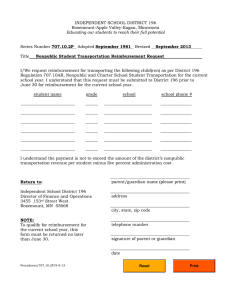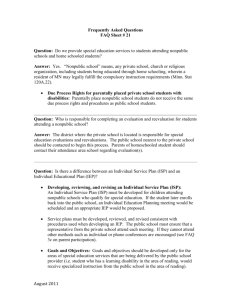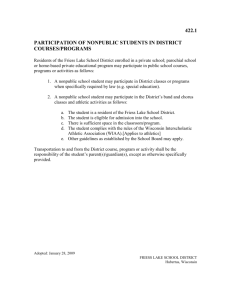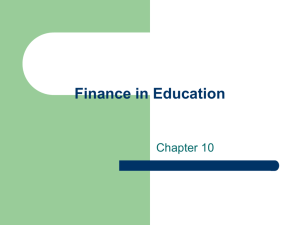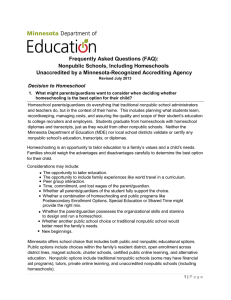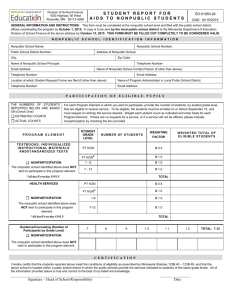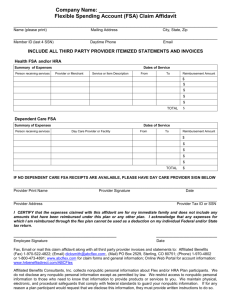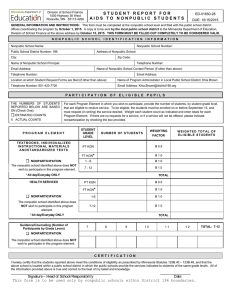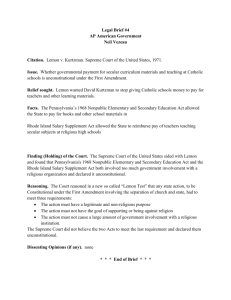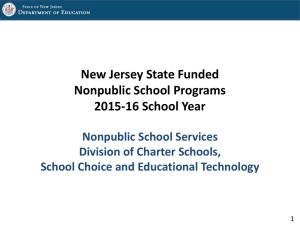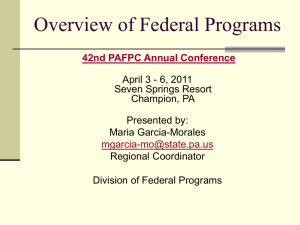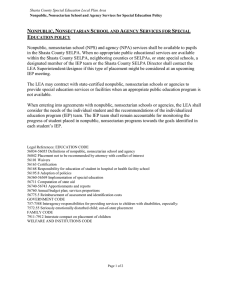LAW_95-100
advertisement
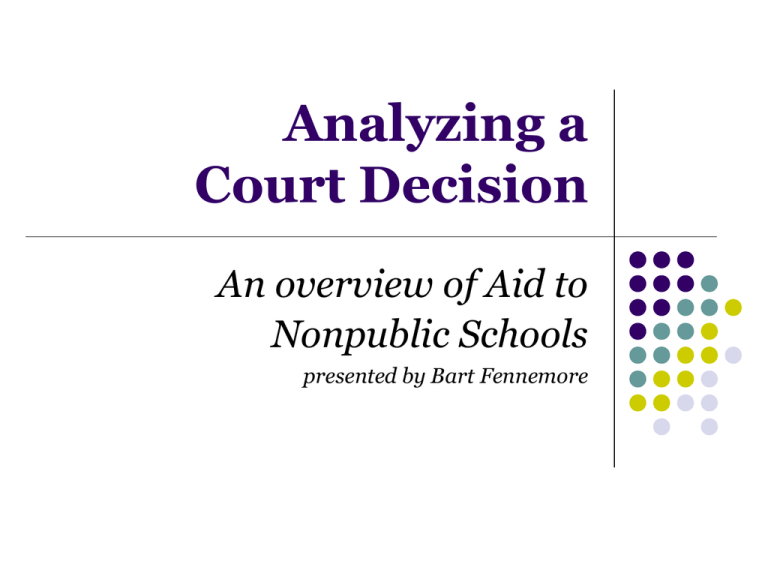
Analyzing a Court Decision An overview of Aid to Nonpublic Schools presented by Bart Fennemore Reimbursement Case: Lemon v. Kurtzman Court: 403 U.S. 602 States with large percentages of private schools that were/are religious-affiliated had legislatures attempting to pass laws allowing for financial aid for these schools. The first amendment issue of proper separation of church and state was addressed. Excessive entanglement between government and religion. Case: Levitt v. Committee for Public Education and [sic] Religion Liberty Court: 413 U.S. 472 Court ruled that reimbursement for expenses on state or state required records and recordkeeping would go against the first amendment's separation of church and state. Reimbursement Case: Committee for Public Education and Religious Liberty v. Regan Reversed ruling from the Levitt case on the matter of reimbursement for expenses related to "keeping official attendance, and other records, for administering three state tests, and for grading two of the tests," as there had been a revision to the law. Case: Committee for Public Education and Religious Liberty v. Nyquist Court: 413 U.S. 576 No reimbursement for maintenance or repair, nor tuition reimbursement for qualifying parents or tax relief for those that did not. Law was in violation of the Establishment Clause. Case: Sloan v. Lemon Court: 413 U.S. 825 No tuition-grant allowed. Resources Case: Meek v. Pittenger Court: 421 U.S. 349 Limited the amount of aid given to "exceptional, remedial, or educationally disadvantaged nonpublic school students" to textbook-loan only. Ruling made because it would appear to advance religion given that a majority of the schools that would benefit were religious schools. Case: Wolman v. Walter Court: 433 U.S. 229 Allowed for the state, Ohio, to aid students with books, as well as testing, diagnostic, therapeutic, and remedial services. Bellsand-whistles aid (i.e. field trips) was ruled unlawful. Resources Case: Agostini v. Felton Court: Supreme Court | Court: 521 U.S. 203 Allowed Chapter I/Title I monies to be used in nonpublic schools. Overruled Aguilar v. Felton (473 U.S. 402) and Grand Rapids School District v. Ball (473 U.S. 373) Key points: Does aid result in governmental indoctrination? Are recipients defined by religious reference? Does aid create an excess entanglement of government and religion? Case: Mitchell v. Helms Court: Supreme Court | Court: 530 U.S. 793 Allowed for loaning of computers, software, and library books to religious schools (nonpublic schools). As long as allocation of resources was based in neutrality toward all contending parties this was an allowable law. Overruled holdings in Meek v. Pittenger and Wolman v. Walter Tax-Deductions & Vouchers Case: Mueller v. Allen Court: 463 U.S. 388 Minnesota tax law, an allowable deduction, upheld because it was indiscriminate of who it benefited. Another case was unlawful because it was discriminate, benefiting only families of nonpublic school children (Public Funds for Public Schools of New Jersey v. Byrne) Case: Zelman v. Simmons-Harris Court: 536 U.S. 639 Vouchers were given to parents allowing students to attend a public or nonpublic school of their parents' choosing. Religious-affilitated schools were chosen most and because the program allowed students (funds) to go to the place of their choosing indiscriminately it was upheld. Transportation Case: Everson v. Board of Education of Township of Ewing Court: Supreme Court Court: 330 U.S. 1 Transportation for nonpublic school students is allowable. Case: Members of the Jamestown School Committee v. Schmidt Court: 405 A.2d 16 Transportation for nonpublic school students is allowable. Case: Board of Education of the Town of Stafford v. State Board of Education Court: 243 Conn. 772 (Connecticut Supreme Court) Transportation for nonpublic school students is allowable regardless of school schedule. Tax-Exemption Status Case: Bob Jones University v. United States Court: 463 U.S. 574 Tax exemption status stripped because racial policy of school was not "charitable" as required by the IRS code.
